Bench Press With Resistance Bands: is it Better?
Author:
Unlock your full potential by engaging with our experts and community! Have questions about your fitness journey or looking for expert advice on weightlifting techniques? Don’t hesitate — leave a comment below and Ihor Shymechko will provide a personalized answer and insights to help you reach your goals.
Torokhtiy is reader-supported. Some links are affiliate links, and we may earn a commission at no extra cost to you. See our disclosure page for details.
If you see some guys in the gym pressing a bar with a couple of resistance bands on it but have no idea why they do that, I’m here to explain everything about bench press with resistance bands.
At first, you may find it weird and wonder why they don’t simply add a few more plates in case they want more load. However, elastic band bench press is a wonderful drill that brings unique value to your workouts. Let’s find out why!
So what is bench press with resistance bands. Bench pressing with resistance bands is a great way to increase your strength and power. When you bench press with resistance bands, it allows you to activate more muscle fibers which results in more force production and improves technique for new PRs in the future.
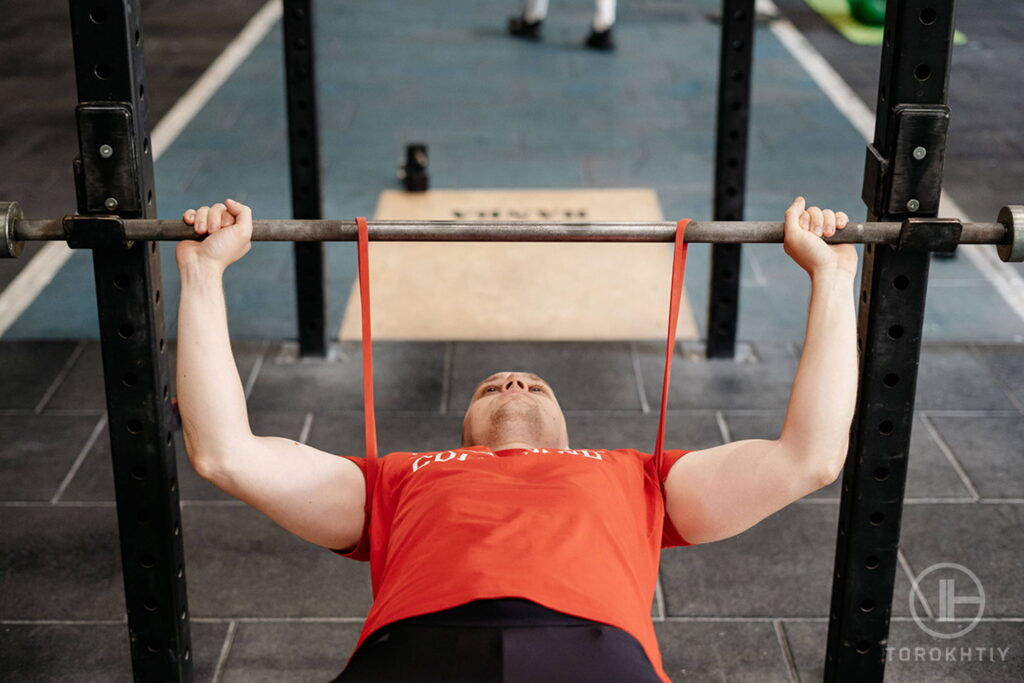
Bench Press With Resistance Bands: What Is It?
The resistance banded bench press is a type of the bench press that uses resistance bands to provide additional load. The bands are attached to the barbell, so as you press the weight up, the bands stretch and add more tension.
The barbell elastic band bench press is a great exercise that you can use to increase the challenge of your workout and build more strength and power. Additionally, because the bands provide an unstable surface, they boost your stabilizer muscles and improve your balance and coordination.
Banded Bench Press Benefits
There are many benefits of bench pressing with resistance bands, but here are the 5 main reasons why it’s better than using only a barbell.
Increased Muscle Activation
Research has shown that resistance bands activate more muscle fibers than free weights, which results in more force production. In other words, you’ll be able to improve your bench press and build more muscle mass while practicing the banded bench press regularly.
Improved Balance and Coordination
As mentioned, bench pressing with resistance bands will also challenge your stabilizer muscles and improve your balance and coordination. This is because the bands provide an unstable surface, which forces your stabilizer muscles to work harder. As a result, you’ll not only build strength in your chest and arms but also improve your overall athleticism.
Different Strength Curve
Usually, the bench press feels really hard at the bottom, and you may have some sticking points at that stage, but it becomes easier to press as you move up. However, resistance bands change this strength curve upside down.
When you stretch a band, it adds more tension and makes it harder to press closer to the lockout. Such a peculiarity can be helpful to create new stress for your muscles and make them progress as well as improve technique and break through sticking points.
Increased Metabolic Demand
Because resistance bands require more energy to stabilize, they also increase your metabolic demand. This means that you’ll burn more calories and fat while you’re working out. Additionally, the increased metabolic demand will continue after you finish your workout, so you’ll continue to burn calories and fat for hours afterwards.
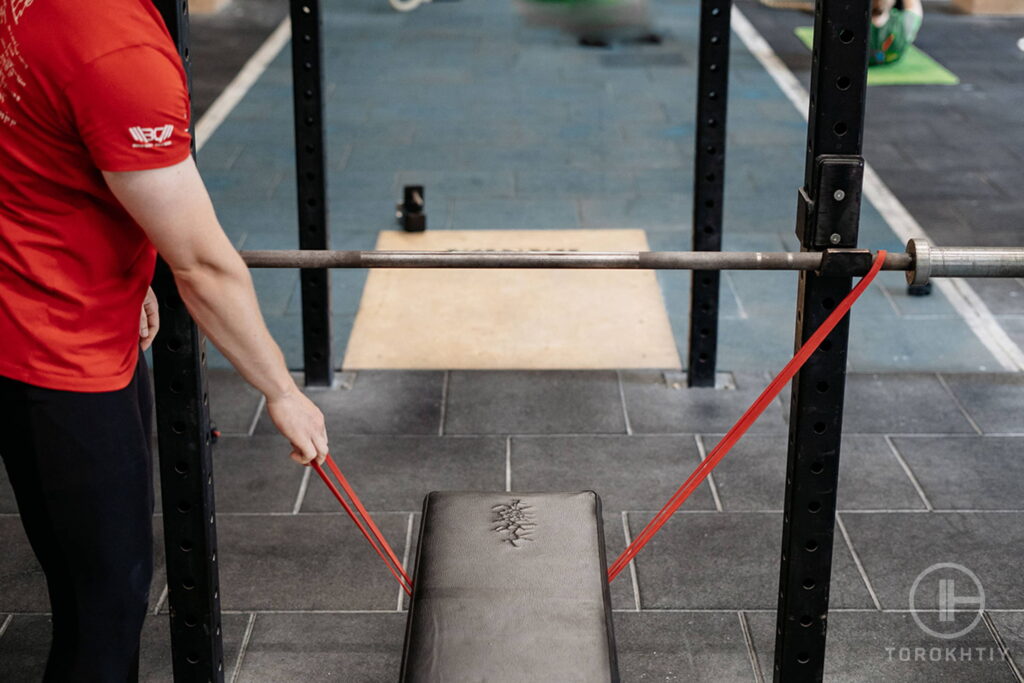
Possible Drawbacks
Though the banded bench press is a great tool to make your training more effective, it does have some disadvantages that you should always keep in mind.
Lighter Weights
In the banded bench press, you can’t handle as many plates as in the traditional bench press. So it’s not the best exercise to show off and impress your gym fellows.
The banded bench press is more about honing your technique and adding variety to your training rather than loading a huge bar.
Injury Risk
This exercise puts more stress on your joints as it demands far more coordination, balance, and control than the regular bench press. You should become really confident and stable in your technique before trying out the banded variation or you may get a serious injury.
Longer Recovery
As the banded bench press puts more stress on your muscles, it may take more time to recover and get ready for another chest workout. Always keep that in mind while planning your training.
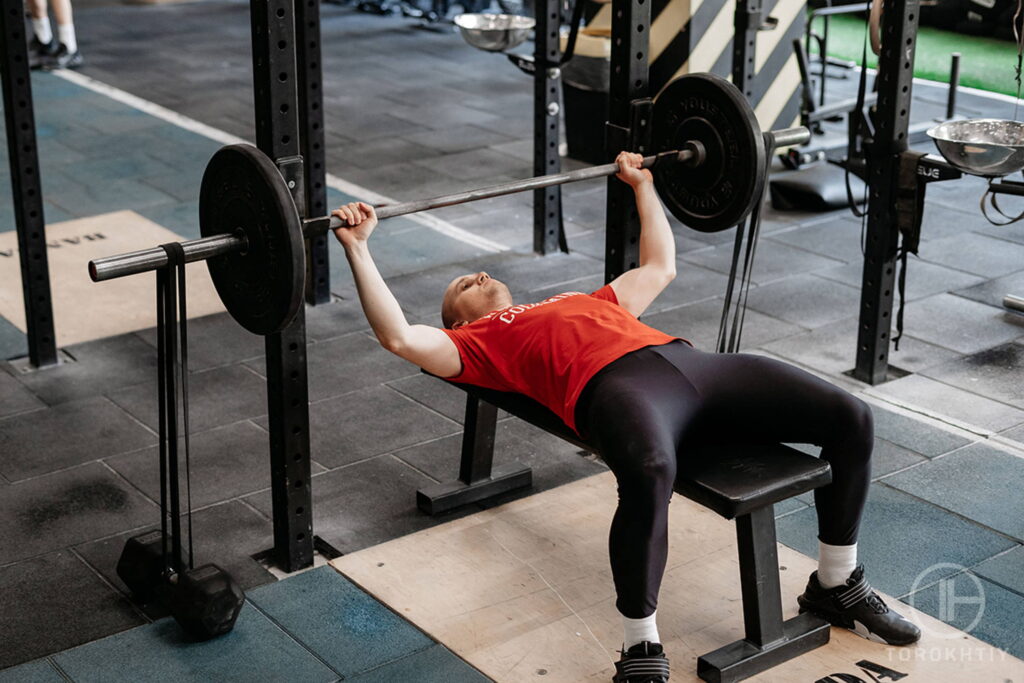
Who Should Use Bands for Bench Press?
Anyone who wants to build more strength and power can benefit from using resistance bands for the bench press. However, because the exercise is more challenging, it may be especially beneficial for intermediate and advanced lifters. If you’re new to using bands, start with a lighter weight and work your way up as you get comfortable with the exercise.
How to Perform a Resistance Banded Bench Press
The banded bench press is performed the same way as the standard barbell bench press, but with one key difference. By following these steps, you’ll be sure to properly execute the resistance banded bench press and get the most out of the exercise.
But first, I want to recommend resistance bands for the bench that I like most – TheFitLife Resistance Pull Up Bands. They have never let me down in my training.
For a reasonable price, you get a whole set with different loads that can be used for plenty of exercises. I also find them really comfortable on the skin.
Read how to perform the resistance banded bench press workout with them below.
- Set up a bench press station with a barbell and resistance bands. You can fasten them to the racks (you need 2 bands in this case) or to the bench (1 band is enough). Attach the bands to the barbell so they’re evenly distributed on each side.
- Lie on the bench and grasp the barbell with an overhand grip, your hands shoulder-width apart.
- Lower the barbell to your chest just the way you do it in the traditional variation.
- Press the barbell up, extending your arms until they’re straight, and repeat.
- Perform 3-5 sets of 6-10 reps.
Tips for Success
There are a few things you can do to ensure success with your resistance banded bench press. Here are a few tips to help you get where you want to be.
- Use a lighter weight than you would for the traditional bench press. Because the exercise is really challenging, you won’t be able to lift as much weight.
- Focus on quality over quantity. When using resistance bands, it’s important to focus on performing each rep with the perfect technique. This will help you get the most out of the exercise and avoid injury.
- Don’t forget to warm up. As with any exercise, it’s important to warm up before you start lifting. This will help prepare your muscles for the exercise and prevent injury.
By following these tips, you can make sure you’re performing the resistance banded bench press correctly and safely. If you have any questions or concerns, be sure to speak with a qualified coach before beginning any workout routine.
Bench Press with Resistance Bands Variations
There are a number of different exercises that you can do with bench press bands. Here are some of the most popular.
Standard Banded Bench Press
This is the basic exercise that was described above. Simply attach the bands to the barbell, lower and press it up.
Close Grip Banded Bench Press
This exercise is performed the same way as the standard bench press, but with a narrower grip. This puts more emphasis on the triceps.
Incline Banded Bench Press
This exercise is performed on an incline bench instead of a flat bench. This targets the upper-chest muscles.
Decline Banded Bench Press
This exercise is performed on a decline bench instead of a flat bench. This targets the lower chest muscles.
Dumbbell Bench Press with Resistance Bands
If you want to increase the challenge of your workout, you can also perform the dumbbell bench press using resistance bands. This exercise is performed the same way as the standard dumbbell bench press, but with one key difference. Instead of just holding dumbbells in your hands, you’ll wrap resistance bands around your palms. This will increase the resistance and make the exercise more challenging.
How to perform the dumbbell bench press with resistance bands.
- Put a band on your back at the shoulder-blade level and place the ends in your palms.
- Grab the dumbbells and lie on a flat bench.
- Lower the dumbbells to the sides and press them up until your arms are extended.
- Repeat for the desired number of reps.
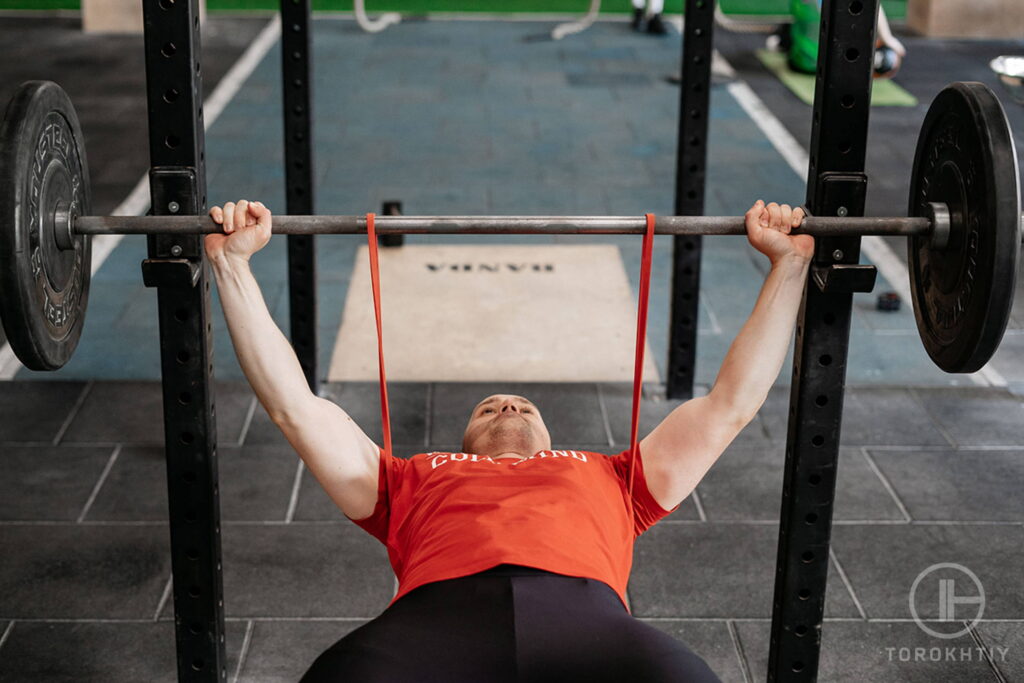
FAQ
Why do people put resistance bands on the bench?
There are a few reasons why people put resistance bands on the bench. The first reason is that it increases the challenge of the exercise. Additionally, it can help to improve your technique. Finally, it can boost your physique and increase your metabolic demand.
How much weight do bands add to bench press?
The amount of weight that the bands add to the bench press will depend on the type and thickness of the bands. Generally, lighter and thinner bands will add less weight than thicker and heavier ones.
The kind of band that you use will also affect the amount of weight that is added. For example, a mini band will add less weight than a powerlifting band.
Can you use too many resistance bands?
Yes, you can use too much resistance when performing exercises with bands. If you use too much resistance, you may not be able to complete the exercise or you may put yourself at risk of injury.
It’s important to start with lighter resistance and gradually increase it as your strength and fitness level improve.
Can you bench press with resistance bands only?
Yes, you can use resistance bands only. However, you may not be able to use as much weight as you could if you were using a barbell or dumbbells. Additionally, your range of motion may be limited when using resistance bands only. So, if your goal is to increase your strength, you may need to use a barbell or dumbbells in addition to the resistance bands.
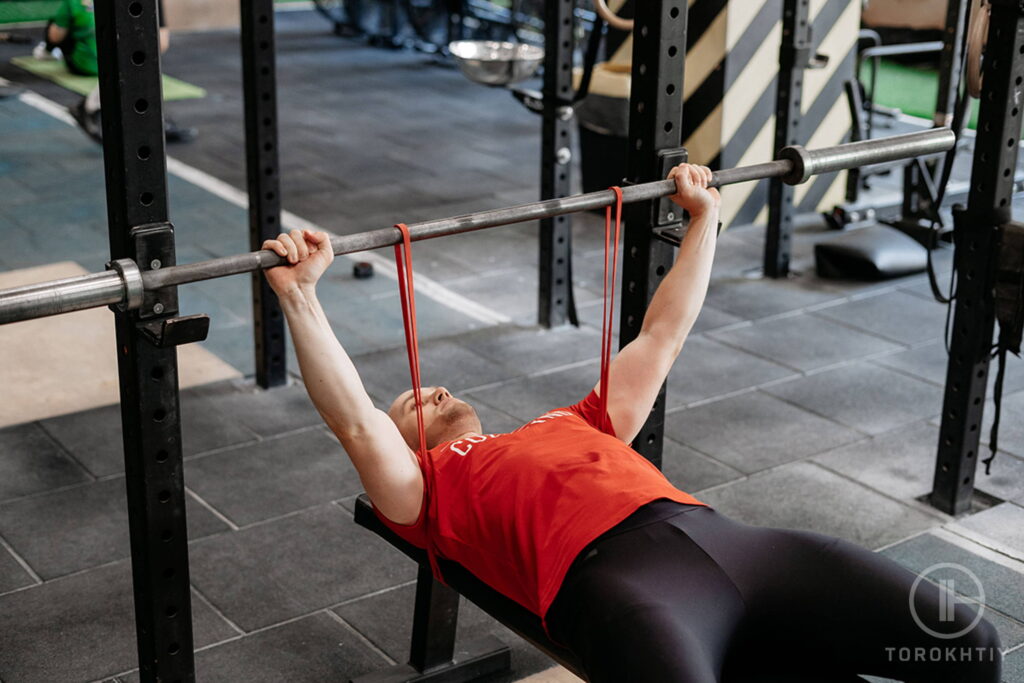
The Bottom Line
Resistance bands are a great way to increase the challenge of your workout and improve your results. If you want to boost your overall athleticism and hone your technique, then you should definitely consider using resistance bands.
They’re a great way to add variety to your workout and take your training to the next level. Yet, it’s a more serious challenge than a traditional bench press, so it’s perfect for intermediate and advanced lifters. Be sure to focus on quality over quantity and warm up before starting your workout.
If you have any questions or concerns, please feel free to leave a comment in the section below.
Also read:
- Resistance Band Tricep Workout
- Resistance Band Chest Exercises
- Resistance Bands vs Weights
- Row With Resistance Bands
- Resistance Bands Guide
- Weight Bench Guide
References:
- The Effects of Combined Elastic- and Free-Weight Tension vs. Free-Weight Tension on One-Repetition Maximum Strength in the Bench Press // NSCA:
https://journals.lww.com/nsca-jscr/Fulltext/2011/02000/The_Effects_of_Combined_Elastic__and_Free_Weight.24.aspx - How to Add More Intensity in Your Workout Routine // Verywell Fit:
https://www.verywellfit.com/ways-to-add-intensity-to-your-workouts-1231603
Why Trust Us?
With over 20 years in Olympic weightlifting, strength training, nutrition coaching, and general fitness our team does its best to provide the audience with ultimate support and meet the needs and requirements of advanced athletes and professional lifters, as well as people who strive to open new opportunities and develop their physical capabilities with us.
By trusting the recommendations of our certified experts in coaching, nutrition, and sports training programming, as well as scientific consultants, and physiotherapists, we provide you with thorough, well-considered, and scientifically proven content. All the information given in the articles concerning workout programming, separate exercises, and athletic performance, in general, is based on verified data.
The product testing process is described in more detail here.
Author: Ihor Shymechko
Pro Olympic Weightlifter, Coach
Best Results: Snatch – 208 kg,
C&J – 240 kg
Ihor has been a professional weightlifter since 1996, boasting over two decades of competition experience. His notable achievements include clinching the European Championship in 2009 and securing a silver medal in the 105kg division at the Senior World Championships in 2011. Ihor represented his country in the 2008, 2012, and 2016 Summer Olympics. After retiring from competitive weightlifting, he transitioned to coaching, leveraging his vast experience to guide athletes who now compete on both national and international stages.




Still have questions after reading our article? Unlock your full potential by engaging with our experts and community! Don’t hesitate — leave a comment below and Ihor Shymechko will provide a personalized answer and insights to help you reach your goals.